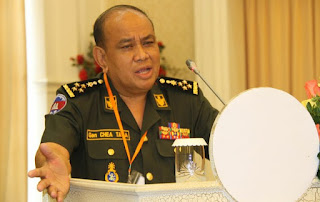 |
| [Image www.khmertimes.kh.com] |
By Khmer Wathanakam
www.khmerwathanak.blogspot.com
 |
(Image credit to VOD) |
After a year-long protest to election fraud and demanding of independent inquiry, CNRP get one crucial concession from the ruling party: a restructure of National Election Committee (NEC) including deeply electoral reform. The new NEC members who previously handpicked by CPP, now are well-balanced between the two parties, tipping with an independent minded candidate from civil society, Dr. Pung Chiv Kek, the most compromised face for the two parties. And more surprisingly than that the CNRP will select other two
candidates from civil society for its quota. Such a good will from the CNRP has proved that the party is so serious about making such a vital national institution to be a professional and independent body that has a capability to avert future post-election crisis which has dominated Cambodian politics over the past two decades. Nonetheless, it's just a beginning of a process of recruiting candidates and detailing election reform; there are a lot more difficult works to be done to make this new NEC the first and most independent national institution in the country. But now the negotiation of an electoral reform has been stalled again since the CPP still tries to dominate on this new electoral body, intending to make it a bias one again. The demand by the CPP for the NEC members hold only one citizenship, to get a secretary general position, and to choose local election officials by sub decree have pushed the negotiation into a stalemate. Now the CPP's old tactic has been used again--to use the court under its control to imprison opposition members and land rights activists including Buddhist monks as the political hostage in exchange for more concession from the CNRP on negotiation table.
The crux is to create the NEC as much independent as possible since it is only a national institution in which the opposition holds half of its power while the rest of institutions from courts, police, military, and even royal institution are firmly under the CPP's control. If we cannot make such a crucial institution independent from the CPP's control, there is nothing we can do to reform the other institutions which should be independent and neutral from political parties. If the CPP insists all NEC members must hold only one citizenship then Dr. Pung Chiv Kek, the only independent candidate, will be the first one to be out from this process, and some of CNRP's nominees will be disqualified too. At the end, the new NEC will not have more competent members to do the job. Dual citizenship should not be an obstacle in choosing the members as long as those candidates have high talent and skill in doing the job and independent minded from political parties. For the secretary general position, either party should hold that position, but he or she should has no power to vote in the committee, and all decision makings must be based on two-thirds majority, not absolute majority or 50%+1 formula as practiced in the National Assembly votes. Such procedure is the only way to keep balance of power in the NEC. Without such a balance of power, the CPP will control the new NEC again. For local election officials who are not contractors should be classified as civil servants based on their qualification, not by appointing by government sub decrees. Currently, all local election officials were appointed by the government, and they were instructed to work for the sake of the ruling party, not the people.



































.jpg)
